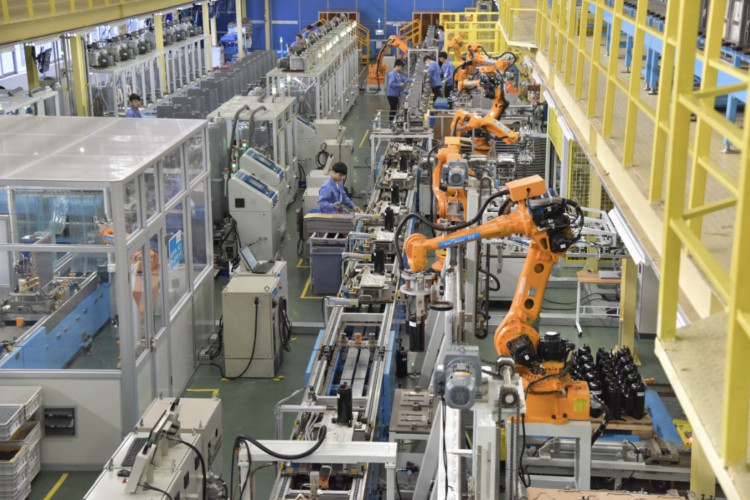Midea Group, a big China household appliance manufacturer, said it will spend 3 billion yuan ($452.7 million) to build a manufacturing base for electro-mechanical products in Foshan, Guangdong province.
The company said this is aimed at the goal of becoming the "national example of intelligent manufacturing of Industry 4.0."
Industry 4.0, or the fourth Industrial Revolution represents the fusion of advances in artificial intelligence, robotics, the Internet of Things, 3D printing, genetic engineering, quantum computing and other technologies.
Midea expects the new factory to generate an output value of 15 billion yuan once its full production capacity is brought online.
4IR Factory Sheds Light On Efficiency
In September, another Midea factory gained attention for its 4IR achievements. Its household air conditioning factory located in Nansha, Guangzhou was selected by the World Economic Forum to join the Global Lighthouse Network, an honor granted to 54 companies internationally in various industry sectors. GLN was formed between WEF and McKinsey & Company in 2017 in efforts to recognize manufacturing advancements around the world.
The Nansha factory improved labor efficiency by 28%, reduced unit costs by 14% and shortened order lead time by 56% through 4IR technologies to transform an automated factory into an end-to-end connected value chain, according to a WEF statement.
As Midea's first intelligent manufacturing base, its Nansha factory, saw a labor reduction from 6,000 at its peak to 3,000, while net profits increased by nearly 20% after undergoing this technological revolution, a Nansha factory representative told Nanfang Daily.
Over the past six years, the company has reportedly spent more than 50 billion yuan in research and development , transforming from traditional manufacturing to digital manufacturing. Among the nearly 10,000 R&D employees, more than 500 are foreign experts, according to public information.
The new factory will deploy M.IoT, an industrial internet of things platform Midea developed, bringing robotic automation in combination with 5G, AI, AR, Big-data and cloud technologies, said the company chairperson and president Fang Hongbo.
China Factory Evolving Liasions
The China government has a variety of incentives supporting Made in China 2025, a national strategic plan issued by Premier Li Keqiang and his cabinet in May 2015 to alter the nation's manufacturing sector from quantity- to quality-focused production. Midea has been developing and expanding its industrial automation and intelligent manufacturing over the past few years.
As of 2019, China-based manufacturing accounted for 28.1% of the world total, its 10th year ranking first in manufacturing, according to the Ministry of Industry and Information Technology.
Midea sought international strategic collaboration with foreign automation companies, initially with Japan's Yaskawa Electric. The two companies formed separate industrial robotics joint ventures in Guangdong province in 2015, with each investing 100 million yuan. These ventures were dedicated to developing the business of manufacturing robots targeted at rehabilitation and patient care in China.
In May 2016, Midea announced a nearly 4 billion euros ($4.724 billion) investment to increase its stake in German robot-making giant Kuka AG from 13.5% to 30%. Kuka's multifunctional robots represent a critical building block for enterprises upgrading their factories toward full automation, through human-to-machine interfaces and machine-to-machine communication.
Midea said at the time, through Kuka's advanced automation, the company aims to improve production efficiency and upgrade its manufacturing model. The two companies would also collaborate to exploit the "broader robot market in China."
It closed the deal in 2017, with a voting stake of 94.55% in Kuka. In the same year, Midea acquired control of Servotronix, a 3-year-old Israel company, for $170 million. Servotronix develops automation solutions focused on motion control for robotics, printing, textiles, medical equipment, renewable energy, computer numerical control and machine tools, food and beverages and electronics.
Midea announced in July the dissolution of its two joint ventures with Yaskawa Electric. The termination was a result of Midea's acquisition of the Kuka concern, the company said. Midea and Kuka's investment agreement will have a fixed term of seven-and-a-half years.
Analysts said that investment in industrial robots, in some regions, was part of a political performance project, which falsified actual market prospects. The domestic robot market experienced escalated growth in 2017 and has slowed recently. China sold 153,100 domestically made industrial robots in 2019, a decline of 2.1%.





